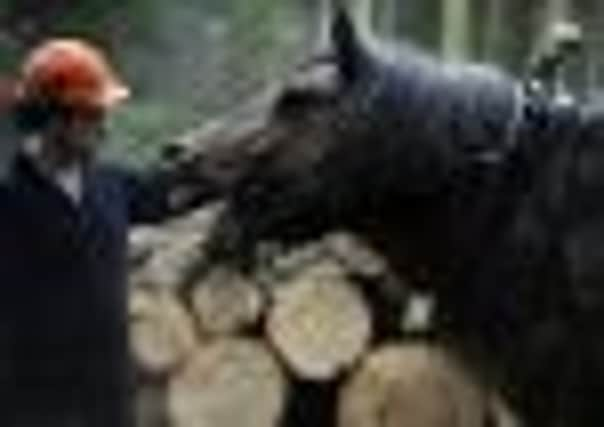Deep in the forest, noble tradition of horse-logging risks dying out


Anyone in Scotland using horses to extract timber has to rely on skilled practitioners from England carrying out the work, as Prince Charles discovered when he needed logs removed from the grounds of Dumfries House in Ayrshire.
The prince, who is patron of the British Horse Loggers, has insisted that all timber removal on his land is done by traditional means rather than by machine.
Advertisement
Hide AdAdvertisement
Hide AdBut a lack of qualified horse-loggers in Scotland meant that Simon Lenihan, one of a handful of horse loggers still working in the UK, was drafted in from Cumbria to work at the prince’s 18th-century stately home.
Simon acknowledges that using horses to recover logs, the main form of timber extraction until the 1940s, is a vanishing trade in Britain but points out that it is thriving elsewhere in Europe.
“There are 6,000 horse loggers in Sweden and 4,000 in Germany but only a handful in the UK and very few left in Scotland,” he said.
“Other countries seem to manage areas using draft horses whereas here it doesn’t seem to matter to people as long as they get the job done.
“People say it’s nostalgia and those days have gone. But why are they still using horses in modern countries like Sweden and Germany? Simply because they have not found a more environmentally friendly way of doing it.
“It is sustainable and there is zero carbon footprint.” Both of Mr Lenihan’s sons, Ian 23, and David 18, have learned their father’s trade and work with him whenever possible.
“They are both competent horsemen but they are both looking to emigrate because of problems getting work. Its such a shame,” he said.
One of the last remaining horsemen, Jim Johnstone, based in Dumfries, recently gave up and sold two horses but will re-start on a part-time basis next month: “It’s a pity. There are benefits but the whole thing is driven by money nowadays. Prince Charles has tried to revive the whole thing, but if he can’t get any joy who can?”
Advertisement
Hide AdAdvertisement
Hide AdJohn Morton farms near Kilmarnock and also works with horses. He said: “You can’t compete with a machine but the environmental impact of using machines long-term is horrendous.
“A logging operation using a horse recovers within months rather than years with a machine. If these skills die out, its not like flicking a switch it will take a long time to learn again.”
Rab Erskine runs a small family business in Innerleithen in the Borders with daughter Caitlin and has recently completed training in horse logging which he does as well as being a full-time counsellor and therapist.
He said: “We are all meant to be doing something to combat global warming. It’s lovely working in the woods, it’s just the most amazing way to work with a horse and they feel at home there.”